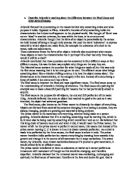The efficient cause is the means in which something actually becomes something, which includes the maker, the tools and the skills being used. The efficient cause along with all the causes play an important part in causality. Without the efficient cause the skills/maker/tools would not be present, which means that the final cause would not be produced. Or in fact the formal cause would not be existent as there would not be any work being done. Which would therefore mean that there would just be the substance.
The formal cause is the form, shape etc of the completed thing. However, the formal cause is constantly changing, it will never stay the same. Most similar things will consist of the same properties. But although this is true in most cases, the properties will be different in things, like size, shape, colour etc, even though they are still the same. Which shows that variation and change occurs within the formal cause.
Aristotle noticed that there was some flexibility in that the formal cause in one circumstance could be the efficient cause in another. Even though he realised this, he said that everything must include a final cause, as there is a purpose, a goal or telos to everything in nature.
The final cause is the something’s purpose. It is the function in which it has been intented on doing. The final cause is made up from everything being combined, in order for this to come about. However, Aristotle had a lot to say on the subject of the final cause especially with the idea of the prime mover (unmoved mover).
Aristotle believed there was a ‘prime mover’, who bought about everything. He said that because we see things in motion, there must someone who set the motion going. Which meant that there was an unmoved mover to begin with, who had set the whole universe going. Aristotle believed that the prime mover was not the efficient cause but was actually the final cause (the purpose of everything).
In conclusion, Aristotle found that everything has a purpose and that if the objects change, then this change also has a purpose.Aristotle sees the whole world as being purposeful.
Discuss the strengths and weaknesses of Aristotle’s views on causality
There are many strengths and weaknesses about the views in which Aristotle has about causality. There have been many strengths in which have helped Christian Theology and other people to understand the concept of the world etc. But still, his views do have the weaknesses, as they begin to confuse people.
The idea of the ‘prime mover’, is a weakness, as this goes very much against the whole concept of the four causes within the causality theory by Aristotle. The ‘prime mover’ is said to be the final cause. But how is this possible, because you need all the other sorts of causes for the final cause to come about (the material cause, the efficient cause, and the formal cause). Without one of these, the final cause could not be present, as the concept would no b complete. This is a weakness, as it confuses readers as to what is right and what is wrong. Does it mean that not everything necessarily has every sort of cause?
Aristotle wrote about the different causes and about how different they are from each other, and without one no other cause can exist. This is another weakness. As it becomes clear that an efficient cause in one thing can also be the formal cause in another, so how I they are so different be the same thing?
Despite the weaknesses of Aristotle’s views on causality, there are strengths to the way that Aristotle views the world and things within it
As Aristotle believed that God was the ‘prime mover’, (i.e. the creator of everything), it became a strength, as it made people see that there was an initial starter. This starter was the cause of everything else. Which meant that people soon believed that God (the prime mover) was the source of all life, goodness, truth and beauty. It gave people hope and faith, that there was someone who cause all this to happen.
The fact that everything including the world had a final cause meant that everything had a purpose. Therefore, it helped to see that everything around us has a cause and therefore has a purpose. This is a strength because it enables people to realise that not everything in the world is jus there because it is, but it actually has a reason/purpose for being there.
There are many views about the strengths and weaknesses of the way in which Aristotle viewed causality. However, I think that the idea about everything having a purpose, is correct and helps to understand why things are there. I don’t agree though that there is a ‘prime mover’, if everything has to have the four causes then what are the other causes of the ‘prime mover’?







